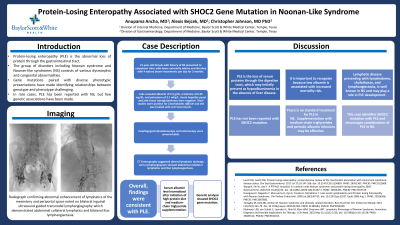Back


Poster Session A - Sunday Afternoon
Category: Small Intestine
A0677 - Protein-Losing Enteropathy Associated With SHOC2 Gene Mutation in Noonan-Like Syndrome
Sunday, October 23, 2022
5:00 PM – 7:00 PM ET
Location: Crown Ballroom

Has Audio

Anupama Ancha, MD
Baylor Scott and White Medical Center
Temple, TX
Presenting Author(s)
Anupama Ancha, MD, Alexis Bejcek, MD, Christopher Johnson, MD, PhD
Baylor Scott and White Medical Center, Temple, TX
Introduction: Protein-losing enteropathy (PLE) is the abnormal loss of protein through the gastrointestinal tract and has been associated with many diseases. The group of disorders including Noonan syndrome and Noonan-like syndromes (NS) consist of various dysmorphic features and congenital abnormalities. Multiple gene mutations paired with diverse phenotypic presentations have made identifying relationships between genotype and phenotype challenging, particularly with PLE in NS. In rare cases, PLE has been reported with NS, but few genetic associations have been made. Our case describes a possible connection between PLE and the SHOC2 gene mutation.
Case Description/Methods: A 21-year-old female with a history of NS presented to our outpatient clinic with lower extremity edema and diarrhea with four watery bowel movements per day for 3 months. Labs revealed albumin of 2.4 g/dL, creatinine of 0.35 mg/dL, and potassium of 3.1 mEq/L. Acute hepatitis panel and anti-tissue transglutaminase were negative. Stool studies were positive for Clostridioides difficile and she was treated with oral vancomycin. She had an unremarkable esophagogastroduodenoscopy and colonoscopy. Computed tomography enterography suggested altered lymphatic drainage, and a lymphangiogram showed abdominal collateral lymphatics and iliac lymphangiectasia. Overall, these findings were consistent with PLE. A high protein diet and medium-chain triglyceride supplementation were initiated, and she had normalization of serum albumin levels. Genetic analysis showed a SHOC2 gene mutation.
Discussion: PLE consists of loss of serum proteins through the digestive tract, which may initially present as hypoalbuminemia in the absence of liver disease. This disorder is important to recognize due to the association between low albumin and increased mortality risk. Lymphatic disease presenting with lymphedema, chylothorax, and lymphangiectasia is well known in NS and may play a role in PLE development. PLE has been tied to the mutation of protein tyrosine phosphatase non-receptor type 11, but to our knowledge, has not been reported with SHOC2 mutation. Because little is understood about PLE in NS, there is no standard treatment. However, supplementation with medium-chain triglycerides and periodic albumin infusions has proven effective. The association between PLE and NS may be more common than acknowledged. This case identifies SHOC2 mutation with PLE and encourages consideration of PLE in NS in hopes of decreasing mortality and increasing quality of life.
Disclosures:
Anupama Ancha, MD, Alexis Bejcek, MD, Christopher Johnson, MD, PhD. A0677 - Protein-Losing Enteropathy Associated With SHOC2 Gene Mutation in Noonan-Like Syndrome, ACG 2022 Annual Scientific Meeting Abstracts. Charlotte, NC: American College of Gastroenterology.
Baylor Scott and White Medical Center, Temple, TX
Introduction: Protein-losing enteropathy (PLE) is the abnormal loss of protein through the gastrointestinal tract and has been associated with many diseases. The group of disorders including Noonan syndrome and Noonan-like syndromes (NS) consist of various dysmorphic features and congenital abnormalities. Multiple gene mutations paired with diverse phenotypic presentations have made identifying relationships between genotype and phenotype challenging, particularly with PLE in NS. In rare cases, PLE has been reported with NS, but few genetic associations have been made. Our case describes a possible connection between PLE and the SHOC2 gene mutation.
Case Description/Methods: A 21-year-old female with a history of NS presented to our outpatient clinic with lower extremity edema and diarrhea with four watery bowel movements per day for 3 months. Labs revealed albumin of 2.4 g/dL, creatinine of 0.35 mg/dL, and potassium of 3.1 mEq/L. Acute hepatitis panel and anti-tissue transglutaminase were negative. Stool studies were positive for Clostridioides difficile and she was treated with oral vancomycin. She had an unremarkable esophagogastroduodenoscopy and colonoscopy. Computed tomography enterography suggested altered lymphatic drainage, and a lymphangiogram showed abdominal collateral lymphatics and iliac lymphangiectasia. Overall, these findings were consistent with PLE. A high protein diet and medium-chain triglyceride supplementation were initiated, and she had normalization of serum albumin levels. Genetic analysis showed a SHOC2 gene mutation.
Discussion: PLE consists of loss of serum proteins through the digestive tract, which may initially present as hypoalbuminemia in the absence of liver disease. This disorder is important to recognize due to the association between low albumin and increased mortality risk. Lymphatic disease presenting with lymphedema, chylothorax, and lymphangiectasia is well known in NS and may play a role in PLE development. PLE has been tied to the mutation of protein tyrosine phosphatase non-receptor type 11, but to our knowledge, has not been reported with SHOC2 mutation. Because little is understood about PLE in NS, there is no standard treatment. However, supplementation with medium-chain triglycerides and periodic albumin infusions has proven effective. The association between PLE and NS may be more common than acknowledged. This case identifies SHOC2 mutation with PLE and encourages consideration of PLE in NS in hopes of decreasing mortality and increasing quality of life.
Disclosures:
Anupama Ancha indicated no relevant financial relationships.
Alexis Bejcek indicated no relevant financial relationships.
Christopher Johnson indicated no relevant financial relationships.
Anupama Ancha, MD, Alexis Bejcek, MD, Christopher Johnson, MD, PhD. A0677 - Protein-Losing Enteropathy Associated With SHOC2 Gene Mutation in Noonan-Like Syndrome, ACG 2022 Annual Scientific Meeting Abstracts. Charlotte, NC: American College of Gastroenterology.
